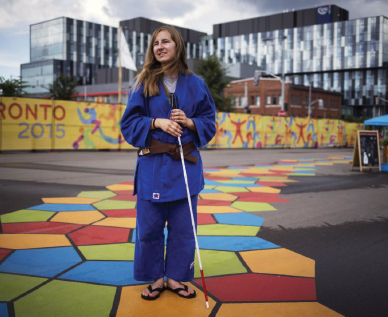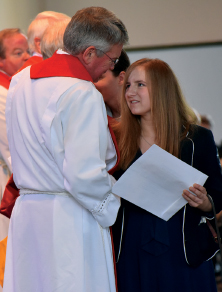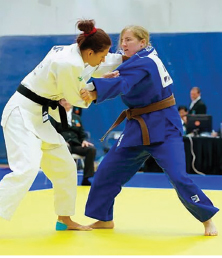
Concordia Seminary Newsroom
Serving God as a deaconess and judoka

By Melanie Ave
She stands 5-feet-2, petite by most standards. She smiles easily and laughs often. Many of her clothes just happen to be pink. She uses the word “excited” a lot because she is and “love” because she does.
But pull back Deaconess Marissa Arndt’s thick blond hair and place her in a dojo and you will see much more than a stereotypical young woman. You will see a fierce judo competitor, one who also happens to be blind. “I’m pretty scrappy,” she admits.
In August 2016, just months after receiving her Master of Arts degree from the Deaconess Studies program at Concordia Seminary, St. Louis, Arndt began a four-year residency at the United States Olympic Training Center
in Colorado Springs, Colo. Ranked No. 2 in the country and No. 15 in the world in judo, she was just three spots shy of earning a spot on Team U.S.A. that will compete in Rio de Janeiro, Brazil, in September at the 2016 Paralympic Games for physically disabled elite athletes. The Paralympics begin right after the Olympic Games.
While disappointed she will not be competing in Rio this year, Arndt, 24, has high hopes for her future judo career. She aims to represent the United States at the 2020 Paralympic Games in Tokyo, Japan.
‘Child of God’
For the next four years, Arndt will lift weights three days a week. She will do cardio five days a week and practice judo four days a week. She will travel to different countries, competing in tournaments and honing her skills and her body. And in two years, she will start the process of qualifying for the 2020 Paralympics.
“She is one of the most awesome people I’ve ever met,” said Dr. Timothy Saleska, the Seminary’s dean of ministerial formation. “She has one of the strongest faiths and strongest resolves of anyone I’ve ever known.” Arndt loves judo to be sure. It has taught her dedication and sacrifice. She has trained with some of the greatest athletes in the world.
“I love that it’s a rough and tough sport,” she says. “Judo is a lot of work and when you do well, you feel that accomplishment. That’s a great feeling. I love that it’s a sport I can play against sighted, able-bodied athletes.”
But for all the joy judo has added to her life, Arndt says God’s mercy tops any gold medal.
“I’m very grateful that I know my identity as a baptized child of God,” she says. “Win or lose, my first real identity is in Christ, not in me as an athlete. That’s something I always keep in mind when I’m competing.”

Deaconess Marissa Arndt (‘16), a paralympic judo athlete, at the 2015 Parapan American Games in Toronto, Canada. Photo: Melissa Renwick/Toronto Star via Getty Images
Night blindness to fog
A native of Hartland, Wis., Arndt is the youngest child of two, raised in a Catholic family. Early on, her parents noticed some oddities with their daughter’s vision. She was night blind and lacked depth perception. By age 3, she was diagnosed with retinitis pigmentosa, a genetic disorder that causes retinal degeneration.
By middle school, Arndt developed tunnel vision and could only read four words at a time. By high school, it was more like straw vision. She could see one letter a time and had no peripheral vision. By the time she left home and started taking classes at the University of Wisconsin, Stevens Point, she developed nystagmus, an inability to focus. Within a week’s time, she went from being able to read print to being unable to even see printed words.
She gets frustrated at times with her lack of vision but she mostly takes it in stride. “I’ve never been angry or sad about it,” she says. “I’ve always known that it could be worse.”
She now has cataracts and sees “fog” most days, she explains. Somedays, good days, she can see outlines with contrasting colors. Apple products — from her iPhone to her computer — read words and numbers to her. She uses public transportation to get around. A seeing eye dog has served as her eyes since age 16. “She’s made things so much easier,” she says about her dog and constant companion, Fray, who recently retired. “She’s just a good friend to have go through everything I have to go through in life.”
‘A rough and tough sport’
Arndt was introduced to judo at a summer sports camp for people who are blind when she was 14. It became a favorite summertime activity. When she was a junior at the University of Wisconsin, she enrolled in judo as an elective and later joined the school’s judo club.
She also started attending a Lutheran campus ministry. She was amazed from her very first women’s Bible study. “I had never read the Bible before,” she says. “I didn’t even know it was God’s Word. I had no knowledge.” She attended the campus ministry twice a week and was confirmed her sophomore year. She also began to feel God was calling her to ministry. She talked to her campus pastor, who encouraged her to change her major from communicative disorders to communications.
After graduation, she moved to St. Louis to start her graduate work at Concordia Seminary so she could become a deaconess. “I loved all the avenues a deaconess could take,” she says. “Hospitals, prison, parish, mission work.”
For two years at the Seminary, she woke at 3 a.m. to do her homework and workout before classes began at 8 a.m. When classes ended at 4:30 p.m., she rode two buses and took a train to the White Dragon Judo Club, where she trained four days per week, before returning to campus by 10 p.m. “It was crazy,” she says.
“She is remarkable in the sense of how she interacts with people and how she gets around,” said Dr. Ronald Rall, senior pastor of Timothy Lutheran Church in St. Louis, where Arndt did her fieldwork as a first-year student. “I know she will continue to serve God in unique ways.”
Even as she undergoes an intense training program in Colorado, Arndt also will be serving the church. She was called this spring as a deployed deaconess to Northbrook, Ill.-based Lutheran Church Charities (LCC), where she served her Seminary internship. She will write weekend devotions and help with event planning and its Comfort Dog outreach ministry.
“God has opened up so many doors,” Arndt says. “It’s amazing. I’m very grateful for it.”
Visit Arndt’s Team U.S.A. page at www.teamusa.org/usa-judo/athletes/Marissa-Arndt.

Seminary President Dr. Dale A. Meyer greets Marissa Arndt during the Theological Diploma Service in May 2016: Photo: Kendra Whittle.

Deaconess Marissa Arndt (‘16) at the 2014 International Blind Sports Federation World Championships. Photo: Courtesy of USA Judo.
“Win or lose, my first real identity is in Christ, not in me as an athlete.”
— Deaconess Marissa Arndt (’16)